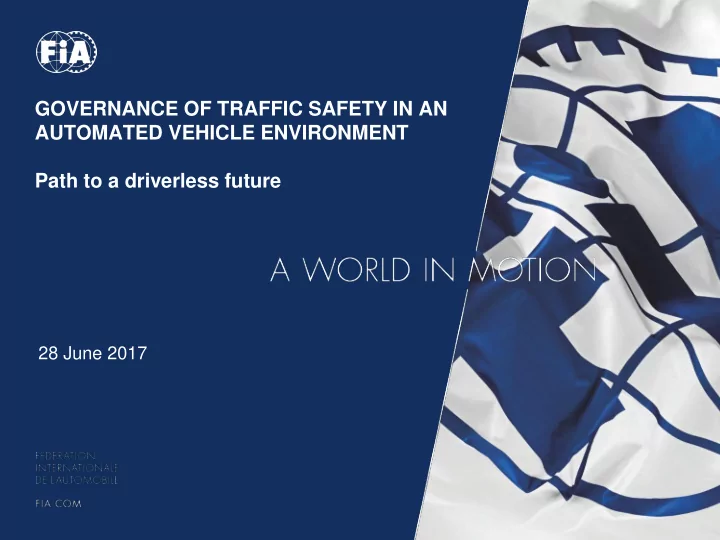

GOVERNANCE OF TRAFFIC SAFETY IN AN AUTOMATED VEHICLE ENVIRONMENT Path to a driverless future 28 June 2017
AGENDA • Autonomous Vehicles and (possible) impact on road users • Preparing for Automation : suggested actions to support governance • Experiences in governance: regulating Motorsport by working with the industry 2
AUTONOMOUS VEHICLES: WHICH VEHICLES CONSUMERS DEMAND? • Safer Cars • Affordable Cars • Accessible Cars 3
AUTONOMOUS VEHICLES: WHICH MOBILITY FOR THE FUTURE? Heaven vs Hell scenario • More single occupant – zero occupant cars (zombi car) ? • Longer trips / time spent in the vehicles • Bigger vehicles? • Increased traffic congestion? • Increased accidents in the ‘transition time’? 4
THE WAY FORWARD: 1. LEARN FROM THE TESTS How much validation is enough? What are acceptable risk levels? Who will validate the systems? Investigate behavioural aspects, specifically: • requirements for the driver-vehicle interface • expectation of drivers of conventional vehicles with respect to autonomous vehicles • factors leading to driver acceptance • training requirements needed for progressive levels of automation 5
THE WAY FORWARD: 2. BUILDING CONSUMERS TRUST • Drivers should be well informed on the systems’ abilities, their limits and constraints • Users need to always understand what is expected from them • Minimise critical attention decrease 6
THE WAY FORWARD: 3. ENCOURAGE COLLABORATIVE ENVIRONMENT • Encourage the development of ancillary technologies that can support AV adoption, with a strong focus on safety 7
THE WAY FORWARD: 4. PRIORITISE ROAD MAINTANANCE PROGRAMME • Basic road markings are essential elements for the function of automation; • The iRap assessment programme; 8
Luca Pascotto FIA Global Public Policy Manager lpascotto@fia.com
Recommend
More recommend